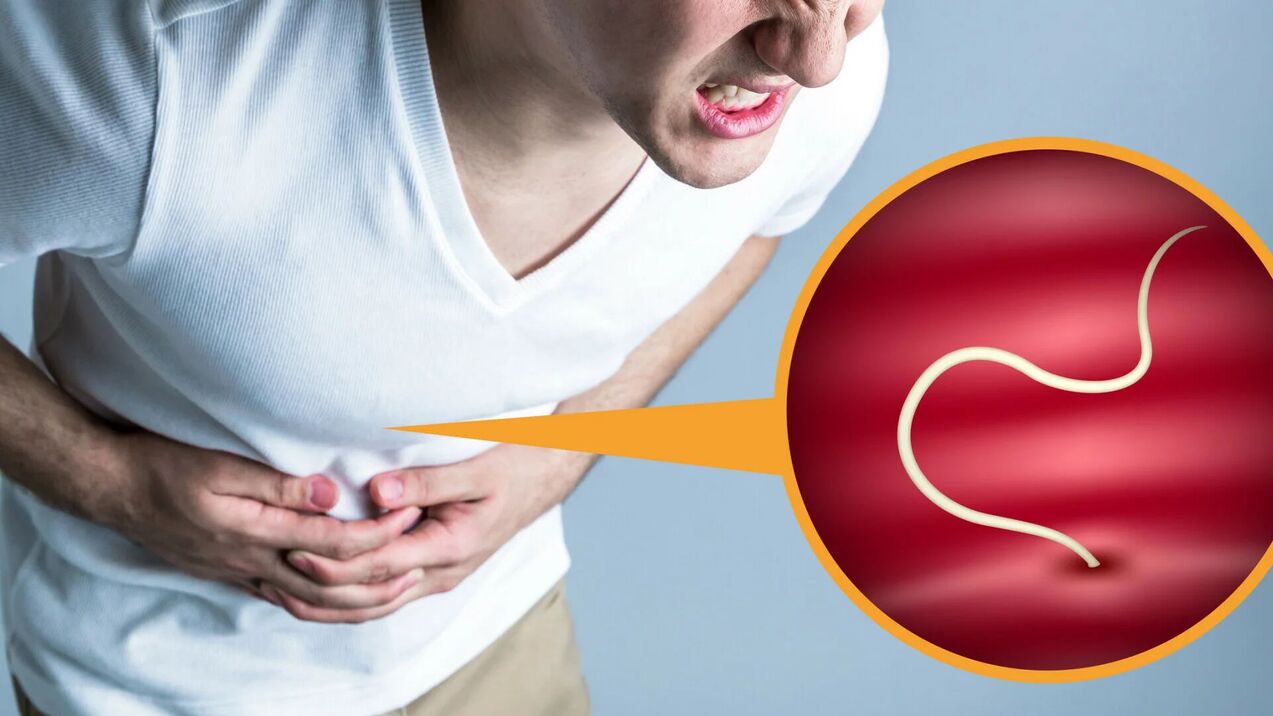Signs of parasites in the human body depend on the specific type of parasite and its waste products. One of the most common signs of parasites in the body is intestinal and stomach discomfort.
According to WHO statistics, approximately 95% of the Earth's total population is infected by parasites, microorganisms that exist and feed on other organisms. Often, signs of the presence of parasites in the human body go unnoticed, because some of them have adapted very well and can be confused with other diseases.
Types of parasites that often infect the human body
The human body is most often inhabited by:
- roundworms;
- pinworms;
- hookworms;
- Giardia;
- whipworms;
- bovine tapeworm;
- wide ribbon;
- pork tapeworm;
- echinococcus;
- trichinella.
Helminths are the general name for worms that exist in a living organism. Simply put, worms. They are classified into the following types: tapeworms (cystodes), flukes (flukes), and roundworms (nematodes). Roundworms are the most common type of helminths.
They are round in shape and live mainly in the intestines and its different parts. Some representatives, for example Trichinella, can migrate throughout the body. The intestine is the main place where roundworms live. Representatives of cattle and pork tapeworms, tapeworms and echinococci. The sizes of the parasites in question can reach several meters in length. Some of them begin to grow outside the human body.
Biohelminths undergo a stage of maturation and development in animal organisms. These include, for example, toxocara, bovine and porcine tapeworms, etc. Soil is the habitat of soil-transmitted helminths. Soil-transmitted helminths thrive in the soil. And they enter humans through the skin or by ingestion. These include many types of roundworms. Contact parasites enter a person through direct contact with another person. Enterobiosis is one of the diseases transmitted by contact parasites, pinworms.

How does the infection occur?
You can become infected with parasite larvae by eating unprocessed foods (fish, cape), poorly washed raw fruits and vegetables, insect bites, sexual intercourse, household methods, drinking raw water, as well as swallowing water while swimming in tanks, from pets. , through the ground.
General signs of the presence of helminths
Very often, it is quite difficult to recognize the presence of the parasites in question in an individual's body. And many symptoms can be mistaken for a chronic illness and treated unsuccessfully. Symptoms of the disease can vary depending on the type of worms, their location and their quantity. But there are general signs of the presence of parasites in the human body.
Allergy
As a result of metabolic processes, worms secrete toxic elements that enter the blood system and contribute to the appearance of allergic manifestations. The rash may appear and disappear periodically. This allergy is difficult to treat with dermatological agents.
Allergies can manifest themselves:
- tearing, eyelid pain and conjunctivitis
- chronic runny nose
- shortness of breath, cough
- rash, peeling and redness, burning sensation
- rosacea, eczema
- corners and inflammation at the edge of the mouth
- leukocytosis is an increase in the number of white blood cells in the blood
- scabies in the anal area (pinworms) and on the body
- problem skin and acne
- asthma and dry cough (hookworms)
- hair loss
Gastric and intestinal discomfort syndrome
Many parasites inhabit the large and small intestines of an individual. They stick to the walls, irritate them and contribute to the appearance of inflammatory processes in the organs. The absorption function of nutrients, particularly fatty substances, is impaired
A large amount of fatty elements in stool can be detected by laboratory methods.
Bile stagnation
Due to their enormous size, some parasites can obstruct the bile ducts and cause biliary dyskinesia. These signs can cause other, more serious liver diseases. Parasites can block the bile ducts, which can harm the liver.
Constipation
Worms can block the intestinal lumen. Often, signs of the presence of parasites in the human body manifest themselves in symptoms such as constipation and can even lead to intestinal obstruction. Diarrhea Diarrhea is one of the most common symptoms of a helminth infestation. Prostaglandins, produced by parasites, cause frequent watery stools.
Dysbacteriosis
Due to intestinal dysfunction, symptoms such as diarrhea, constipation and excessive gas formation appear, which can be confused with dysbacteriosis. But in this case, treatment with antibiotics and probiotics does not give positive results. Decreased immunity Parasites feed on what humans eat. They absorb most of the digested nutrients.
Low immunity can be a consequence of the activity of parasites in the body
Due to the constant response of the immune system to the presence of "strangers", the body's defenses are reduced and the immune system is weakened. This manifests itself in frequent colds, unreasonable temperature rises, body aches, etc.
Pain in joints and muscles
Worms can affect different organs. Trichinella, for example, settles in muscle tissue and can damage it. It is the body's response to the vital activity of parasites.
Change in body weight
One of the signs of helminthiasis is weight loss or obesity. Weight loss is due to the inability to obtain nutrients from the foods consumed. And weight gain, resulting from the body's reaction, is the need to "stock up on food for future use. "Therefore, before making a decision to gain or lose weight, it is necessary to undergo a comprehensive examination for the presence of parasites in the human body.
Anemia
Certain parasites, Trichomonas for example, can infect various human organs, including the blood. By feeding on its cells, helminthiasis causes anemia and iron deficiency. Vitamin deficiency A person suffers from a lack of nutrients and vitamins, which causes vitamin deficiency. This is a consequence of the parasites' gluttony.
Nervousness, sleep disturbances
Insomnia, a short lack of sleep, may be a response of the nervous system to the presence of "illegal" residents. Some helminths emerge through the anus at night to lay larvae. This can cause discomfort and itching, causing you to wake up frequently and not allowing you to fully rest.
"Chronic fatigue syndrome"
Against the background of general intoxication of the body, a lack of vitamins and nutrients absorbed by parasites, an individual may experience constant fatigue, decreased concentration, apathy and memory loss.
Oncology
The presence of parasites does not have the best effect on the human body as a whole. The normal functioning of all organs is disrupted, inflammation occurs, health deteriorates and immunity decreases. Disruption of the normal functioning of the body due to the influence of parasites can lead to disastrous consequences.
It is important to know that all these signs, with prolonged action, can provoke the formation of tumors and neoplasms.
Inflammation of the larynx and respiratory tract
Worms can travel throughout the body. Once they reach the respiratory tract, they cause severe cough, sore throat and fever. Due to their vital activity, even asthma or pneumonia can develop.
You should not ignore any symptoms indicating a malfunction in the body. At the first manifestation of signs of any of the diseases, you should immediately consult a doctor and undergo procedures for checking for parasites. This will allow you to receive timely treatment and prevent the destructive effects of toxins from harming your body. Long-term presence of worms in the human body can lead to the development of serious diseases, including cancer or chronic forms of existing diseases.
Specific symptoms of a parasite infestation
In addition to general signs, there are a number of special signs of the presence of parasites in the human body, characteristic separately for women and men.
For women, it is:
- disruption of regular menstrual cycle;
- vaginal dysbiosis, mycosis;
- inflammation of the ovaries, kidneys, bladder;
- uterine fibroid;
- infertility.
For men, the disease in question manifests itself:
- sexual dysfunction;
- the presence of sand or stones in the kidneys or bladder;
- inflammation of the prostate;
- mental disorders.
Differences in symptoms between children and adults
When parasite larvae enter, they encounter a 3-level protective barrier:
- saliva;
- gastric juice;
- local intestinal immunity.
In the still fragile body of a child, such protection may not work. And it is children who are most susceptible to the disease in question. In summer, when children are constantly outdoors, the risk of becoming infected with helminths is very high. Anything can end up in the sand if its cleanliness is not monitored. There are many ways of infection for children: children's sandbox, pets, fruits and vegetables that are not always washed, swimming in ponds. In addition, especially among the little ones, there is a desire to taste everything.
The habit of thumb sucking only increases the likelihood of contracting a helminthic infestation. The most common types of parasites in children include: pinworms, roundworms, whipworms and toxocara. Pinworms are small white worms measuring no more than 1 cm. They come out and lay their eggs near the anus. Therefore, the presence of such parasites is always accompanied by itching around the anus. Roundworms are larger, their length can reach 40 cm!
Note that the phenomenon of "bruxism" (teeth grinding) is considered one of the signs of the presence of parasites in the human body and often disturbs children in their sleep. Parents should pay attention to this fact and have their child examined for the presence of parasites. Very often, worms live in the intestines, so children may have problems with stools, flatulence, vomiting and epigastric pain.
Parasite diagnosis
The main problem in diagnosing parasitic diseases is that they masquerade as many chronic diseases and it is very difficult to recognize the real causes of the symptoms.

How to determine the presence of parasites
When either organ or tissue is damaged, distinctive features dominate.
In the intestines
The most favorable place for pests to live: high humidity, warm temperature, neutral pH environment. Symptoms of intestinal damage:
- constipation;
- diarrhea;
- flatulence;
- intestinal obstruction;
- spasmodic pain, abdominal cramps;
- weight loss;
- to vomit;
- nervousness;
- lack (or increase) of appetite.
A person is overcome by helplessness, fatigue and reluctance to move.
In the stomach
In the event of a parasitic infestation, the following signs are noted:
- nausea;
- belching;
- salivation;
- heaviness and distension of the stomach;
- diarrhea;
- bleeding during bowel movements;
- itching in the anal area due to pinworms;
- cough due to irritation of gastric neuroreceptors.
In cases of intestinal acne, sputum can be separated from blood fractions.
In the liver
Symptoms:
- pain in the right hypochondrium;
- belching;
- nausea;
- allergic urticaria;
- yellowing of the sclera, oral mucosa, and skin;
- loss of hair follicles;
- weakness;
- irritability;
- anemia.
There is pronounced swelling of the legs and abdomen.
In the blood
Distinctive symptoms:
- fever;
- thickening, enlargement, pain of lymph nodes;
- rash on the body;
- dizziness, headache;
- thirsty;
- lethargy, drowsiness;
- dyspnea;
- circulatory disorders, expressed by numbness and coldness of the extremities.
Anemia inevitably develops, because many parasites destroy red blood cells.
In case of heart injury
There are still signs of lung and heart failure.
- cough;
- dyspnea;
- nervousness, fear;
- weakness;
- chest pain;
- arrhythmia, bradycardia;
- temperature, fever alternating with chills;
- changes in blood pressure;
- sweating;
- pallor of the face, neck;
- anemia.
Signs of hypoxia are observed: cyanosis of the skin of the fingertips, triangle of the nasolabial and oral mucous membranes.
In the lungs
Characteristic symptoms:
- dyspnea;
- difficulty breathing;
- attacks of dry cough at night;
- asthmatic bronchospasms;
- allergic rhinitis, sneezing;
- chest pain;
- rapid pulse;
- nausea.
It is possible to separate rare foamy sputum from blood cells.
Under the skin
External symptoms:
- small, itchy red rash, large swollen blisters on the skin;
- ulcerations, abscesses, warts, eczema;
- fever;
- night sweats;
- dense, mobile tumor-like areas under the skin;
- anemia.
An allergic cough and runny nose often develop.
In the eyes
Distinctive symptoms:
- inflammation of the conjunctiva, accompanied by burning and itching;
- pain in the eyes and pain when you move your gaze to the side, upwards;
- flying spots, cloudy threads before the eyes;
- dry, mucous eyes;
- blurred vision of objects, double vision;
- headache, dizziness;
- swelling of the eyelids;
- blue under the eyes.
There is a significant deterioration in visual acuity.
Parasitosis disguises itself as thousands of diseases, so it is impossible to determine it visually, without laboratory tests. The recovery period depends on the correct diagnosis and identification of parasites at the earliest stage of infection.
In the blood
Parasites that live in blood can live in red blood cells, plasma, and white blood cells. Types of Pests:
- Mansonella is a worm that can reach 8 centimeters. Causes dizziness, headache and joint pain, fever, skin problems, leg numbness.
- Hemosporidia are single-celled organisms that live in red blood cells.
- Trypanosomes are single-celled organisms that cause Chagas disease and sleeping sickness.
- Malaria plasmodium.
Symptoms of diseases caused by parasites
Very often, the disease is named after the parasite that causes it.
Ascariasis
The causative agent of the disease is roundworm, localized in the human intestine. The degree of the disease depends on the age of the patient, the severity and duration of the parasitic infestation.

Symptoms of ascariasis appear as follows:
- a localized allergic skin rash on the patient's feet, hands, and body;
- increased temperature, fever;
- general weakness and malaise;
- sweat at night and during the day;
- enlarged liver and aching pains in the hypochondrium;
- lack of appetite and nausea; pain and cramps in the abdomen;
- constipation and diarrhea; weight loss or gain;
- cough, shortness of breath and chest pain occur during the period of migration of roundworms and their localization in the lungs;
- insomnia;
- decreased cognitive abilities;
- seizures;
- obstructive jaundice and intestinal obstruction.
Hookworm
The causative agents of these diseases are helminths, hookworms and necators. Symptoms of the disease:
- urticaria and dermatitis, when the larvae penetrate the skin, swelling forms at the site of penetration, which causes a burning sensation and itching;
- bronchitis, tracheitis, laryngitis are observed during the migration of parasites throughout the human body, in this case the patient suffers from cough, shortness of breath, hoarseness;
- when the larvae reach the intestines, anemia, vomiting, nausea, abdominal pain, constipation, diarrhea and loss of appetite develop;
- irritability, fatigue, insomnia.
Diphyllobothriasis
The disease is caused by a large tapeworm. Symptoms of the disease:
- weight loss;
- diarrhea and constipation;
- loss of appetite;
- mild fever;
- increased fatigue and fatigue;
- the presence of worms in the stools in the form of white ribbons;
- abdominal cramps and pain;
- anemia;
- dizziness and headache;
- cracks and red spots on the tongue;
- pathological processes in the mouth and esophagus;
- intestinal obstruction;
- depression.
Taeniasis
The causative agent of the disease is the pork tapeworm, localized in the small intestine. Symptoms of the disease:
- nausea and vomiting; fragments of parasite larvae may be seen in vomit;
- diarrhea and constipation;
- weight loss and appetite;
- abdominal cramps and pain;
- anal itching;
- dizziness and headache;
- insomnia and excitability;
- when the larvae are localized in the brain, cysticercosis develops, which is manifested by speech disorders, epilepsy, delirium, hallucinations, loss of consciousness;
- When the parasite migrates, it can enter the eyes, heart and lungs.
Echinococcosis
The causative agent of the disease is the Echinococcus tapeworm. The worm is dangerous because it is capable of forming a cyst in almost any internal organ: heart, liver, brain, lungs, etc. The disease is very insidious, because at first it is completely asymptomatic, and clinical manifestations are observed already in the later stages of the formation of a hydatid cyst.
Symptoms of the disease:
- the appearance of pain at the site of cyst formation;
- weakness, increased fatigue, drowsiness;
- skin allergies in the form of hives and itching;
- disorders in the functioning of the affected organ: if the liver is affected, then the appetite deteriorates, nausea and vomiting appear if the lungs are affected, then there is cough, shortness of breath, fever if thebrain is affected, then epilepsy; paresis of the arms and legs occurs, with the formation of a cyst in the heart, the development of serious heart pathologies is possible;
- When a cyst ruptures, parasites spread with lightning speed to all internal organs and systems, which can lead to very serious complications and even death of the patient.
Alveococcosis
The causative agent of the disease is the alveococcal tapeworm. This disease is considered indolent: 10 years or more may pass from the time of infection to the development of the disease. Symptoms of the disease: dermatological manifestations:
- itchy skin and hives;
- bitterness in the mouth, nausea;
- pain and feeling of heaviness in the right hypochondrium;
- hepatic coli;
- compaction is observed in the liver;
- weight loss;
- weakness and malaise;
- When the parasite is localized in the brain, severe headaches and dizziness are observed.
Giardiasis
The disease develops as a result of infection of the human body with intestinal lamblia. Sometimes asymptomatic carriage occurs, without obvious signs of disease. Symptoms:
- gastrointestinal tract disorders: nausea, vomiting, belching, diarrhea and constipation;
- specific pain in the navel area;
- loss of appetite, flatulence;
- increase in temperature;
- general fatigue, decreased performance;
- irritability and nervousness;
- itchy skin.
Amoebiasis
This disease is caused by a histological amoeba. Sometimes the symptoms of the disease can be completely absent, and sometimes, on the contrary, they manifest themselves very clearly. Symptoms manifest in two forms: intestinal and extraintestinal. With the extraintestinal form of amoebiasis, the lungs, brain, genitourinary system and skin are affected, but the intestinal form is most common.

Symptoms of Intestinal Amoebiasis:
- painful diarrhea, with frequent urges (up to 20 times) sometimes with blood;
- stomach ache;
- increase in temperature indicators;
- vomiting and nausea;
- loss of appetite.
After a while, the symptoms of the disease may disappear on their own for a while, and then reappear with renewed vigor.
Schistosomiasis
The causative agent of the disease is the schistosome blood fluke. The disease has several stages of development:
- at an early stage, the patient develops allergic reactions, which are manifested by skin rashes and swelling, cough with hemoptysis, which has a paroxysmal character with general malaise and pain in the joints and muscles;
- when the disease becomes chronic, the symptoms are limited to disturbances in the act of urination (pain and pain during urination, increased frequency of urination, nocturnal and daytime urinary incontinence);
- There are particularly serious cases that lead to the death of the patient.
There are a large number of symptoms of parasites in the human body. Without laboratory tests, based solely on the symptoms themselves, it is impossible to diagnose the presence of parasites in the body. The severity of symptoms depends mainly on the person's defense mechanisms, the location of the parasite and its type.
To determine the presence of parasites, it is necessary to undergo a series of tests
Additionally, a significant problem is created by the ability of most parasites to exist for a long, sometimes asymptomatic, existence in the human body. Therefore, if there are signs of a sluggish chronic disease, an examination should be carried out for the presence of parasites.
Parasite diagnostic methods:
Direct methods: stool analysis, urine analysis, scraping of the perianal area, subungual phalanges, analysis of sputum and duodenal contents. These methods have a number of disadvantages associated with the characteristics and period of development of the parasite, as well as the state of the human body.
Ultrasound is also used to study the presence of parasites in the body.
To increase the information content of these diagnostics, it is necessary to undergo several examinations. But this does not guarantee that you will receive reliable information. Recently, analysis of stools by the PCR method has been used, which significantly increases the effectiveness of direct methods, since it allows parasites to be identified by their DNA. But this is only if there are parasites in the gastrointestinal tract.
Indirect methods: radiography, morphological, ultrasound, biopsy.
Bioresonance methods: Voll method, ART.
The enzyme immunoassay method involves determining the presence of antibodies to various types of parasites in human blood. This method is very informative and allows you to identify early forms of the disease.
When to see a doctor urgently
At first, there may be no signs of the presence of parasites in the human body. It will take years for the parasite infestation to manifest itself. At the first ailments without cause, you should consult a specialist doctor. It is important to remember that if a person is bothered by any of the symptoms described above, they should immediately contact a specialist (an immunologist or parasitologist), especially if it concerns children.
The doctor will order tests, which may need to be done several times to get more reliable information. Then, an appropriate treatment will be selected. Helminthiasis is a fairly serious and dangerous disease. It is important to remember this and not allow parasites to cause irreparable damage to the body. Therefore, you should follow the rules of personal hygiene, monitor food and promptly seek qualified help from a specialist.


















